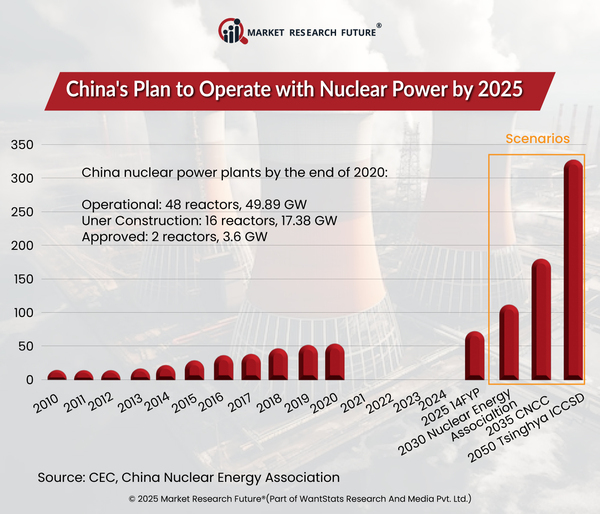China’s Growing Nuclear Energy Development in 2025- A Game Changer for Global Energy
Nuclear energy capacity is growing significantly from the beginning of 2025. It is due to increasing concerns over climate change, and energy security amidst fluctuating fuel prices followed by net-zero targets set up by nations globally. Further, developing countries like China are progressing with nuclear energy generation in 2025. The nation plans to overcome the fossil fuel shortage with an alternative to low-carbon fuel to aid sustainability.
The development of nuclear energy in China provides multiple strategic advantages. It increases energy security by decreasing reliance on coal and fossil fuel imports and enhances energy self-sufficiency. Moreover, this expansion will help achieve China's carbon emission peak by 2030 and neutrality by 2060 goals, drastically cutting down air pollution and meeting international climate promises. Advancements in Chinese nuclear technology, including Hualong One (HPR1000) and Small Modular Reactors (SMRs). Hence, it can help China become a global nuclear innovation leader.
China's advanced nuclear technology can reduce unemployment by increasing technology exports. Moreover, nuclear energy being a stable, pivotable energy source, enhances grid reliability and meets the energy demands of the industrial and urban regions. Further, nuclear energy lessens the dependence on fossil fuels, especially coal. It can lead to a more stable energy supply in the nation. Advanced nuclear technologies can fuel China's targets of achieving carbon neutrality by 2030 and reducing carbon emissions by 2030.
Unlike other clean energy sources, like wind and solar energy, nuclear energy provides an uninterrupted power supply. Hence, rural and urban townships can significantly benefit from China's nuclear advancement. Furthermore, China's nuclear energy exports can help to flourish the nation's economic condition soon. Nuclear power can also overcome the financial risks of oil and gas prices. The initial investment in nuclear energy setup may be high. However, it is one-time and offers long-term operational costs compared to conventional fuel-based energy generation.
China's increasing prominence and innovation in nuclear technology increases its geopolitical power in emerging markets, challenging the U.S., Russia and Europe's stand. In the long run, nuclear energy helps reduce costs due to its potency compared to fossil fuels. It increases economic stability and guarantees industrial growth while controlling the risks from oscillating oil and gas prices.






